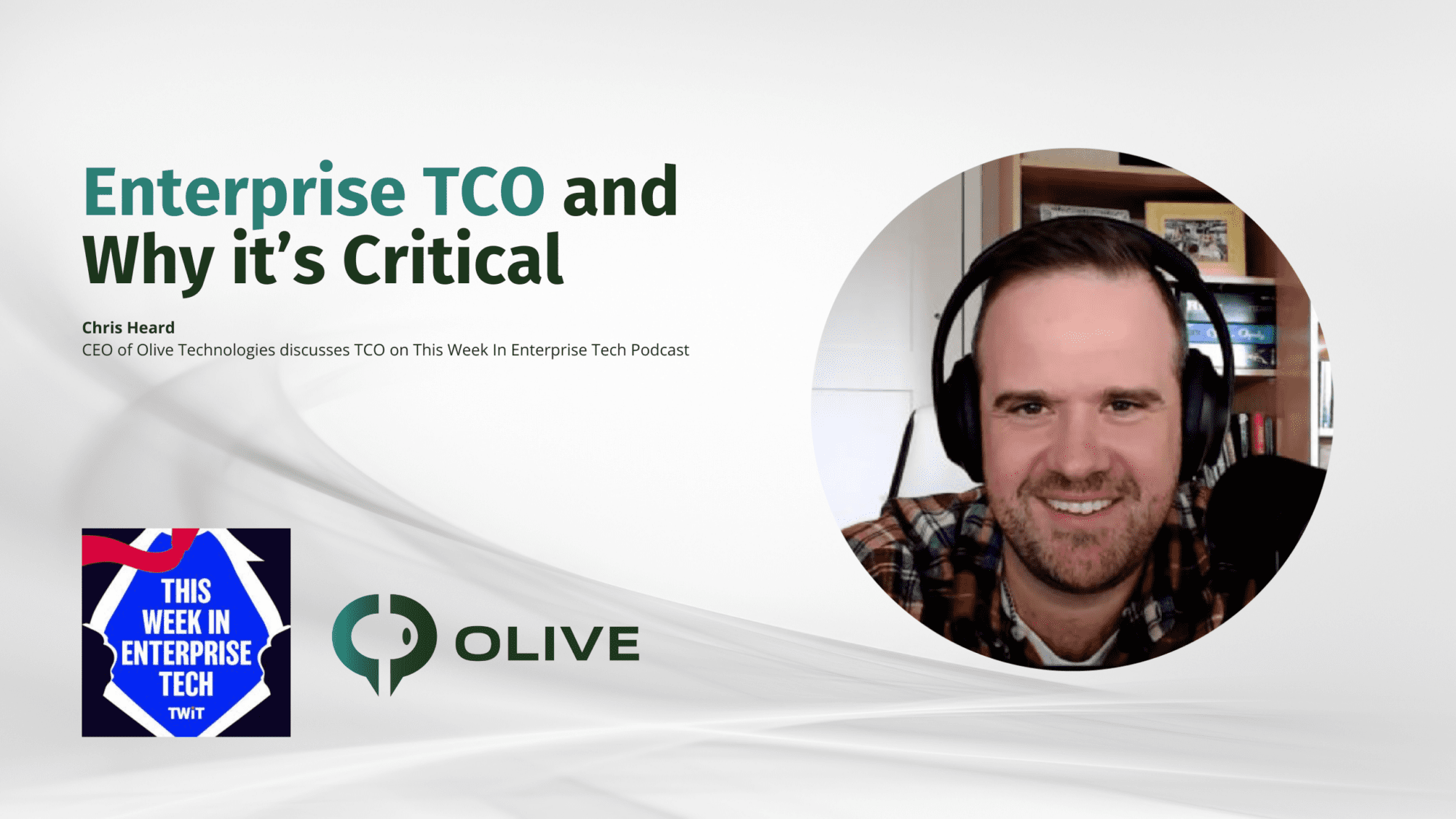CEO of Olive, Chis Heard Appears on This Week in Enterprise Tech to Discuss why TCO is Critical for making informed IT Decisions
The Total Cost of Ownership (TCO) often takes a back seat to more exciting topics. However, understanding the TCO is critical for making informed decisions when investing in new technology solutions. In a recent episode of “This Week in Enterprise Tech” (TWiET), host Louis Maresca, along with Brian Chee and Curtis Franklin, delved into the world of TCO with guest Chris Heard, CEO of Olive Technologies.
Here are some of the key insights shared in the podcast and discuss the importance of considering TCO in the ever-evolving tech landscape.
Unpacking TCO: Not Your Typical Accounting Topic
Host Curtis Franklin kicked off the conversation by highlighting the significance of Total Cost Ownership (TCO) in technology acquisitions. He emphasized that TCO is more than just an accounting topic; it’s a crucial factor that often gets overlooked during the excitement of technology purchases. Curtis introduced Chris Heard, CEO of Olive Technologies, who joined the discussion to shed light on this vital aspect of technology procurement.
Chris’s Unique Journey to CEO
To provide context for his insights, Chris Heard shared his intriguing journey to becoming a CEO. He revealed a diverse background that included stints as a professional poker player, a stand-up comedian, and studies in marine biology. Eventually, he found himself in the tech industry, selling mobile web software in Vancouver, Canada. Chris’s experience as a salesperson allowed him to recognize the biases and challenges in technology sales, leading him to the realization that there was a substantial disparity in the training and tools available for buyers compared to sellers.
The Problem of Imbalance in Tech Decision Making
Chris pointed out that while sales teams receive extensive training on how to sell technology, there’s a dearth of training for IT teams and technical business leaders on how to evaluate and select technology. This imbalance results in buyers making decisions with limited knowledge and often relying on sales pitches to guide their choices. Moreover, third-party influences can sway decisions further, making the process even more complex.
The Birth of Olive: Innovating the Requests for Proposals (RFPs) and Software Sourcing Processes
Recognizing the need to address this problem, Chris and his team founded Olive Technologies. Their core focus was on helping companies manage Requests for Proposals (RFPs) and sourcing processes. Olive’s platform aimed to provide transparency and efficiency in technology procurement, empowering buyers to make informed decisions.
The Role of AI in Decision-Making
AI plays a significant role in modern technology procurement. Chris noted that AI can aid in the decision-making process, but it also brings challenges, such as concerns about legislation and ROI. The impact of AI on ROI is often challenging to quantify, making it essential for businesses to tread carefully when adopting new AI technologies.
The Shift to Cloud and Software as a Service (SaaS)
The shift to cloud and SaaS solutions has altered the TCO landscape. While it has eliminated some costs related to hardware and maintenance, it has introduced new challenges, such as annual price increases and potential security risks. Companies now need to consider intangible elements like data security, risk, and training when evaluating the TCO of cloud-based solutions.
The Importance of ROI
Chris highlighted the significance of considering Return on Investment (ROI) when assessing TCO. Businesses must not only focus on the financial aspects but also evaluate the value a technology solution can bring to the organization. The challenge lies in quantifying the value, particularly in the case of AI, which is still in its early stages.
The Human Factor
The conversation turned to the human factor in technology decisions. Chris acknowledged that industries often overlook the human impact of their decisions. For instance, the automation of certain processes may result in job loss for some individuals. However, he emphasized that businesses should also listen to their customers, as their preferences and needs drive many technological changes.
Preparing for Tech Procurement
Before reaching out to vendors like Olive Technologies, decision-makers should engage in introspection. They should thoroughly understand their current business challenges, prioritize them, and evaluate existing solutions. Rushing into technology acquisitions without a clear understanding of the organization’s needs can lead to costly mistakes.
Understanding the Total Cost of Ownership is essential. The conversation on TWiET shed light on the complexities and challenges associated with TCO and technology procurement. Decision-makers should prioritize aligning IT and business needs, understanding current challenges, and evaluating ROI to make informed decisions. With technology continuing to evolve, staying vigilant in assessing TCO is more crucial than ever.





